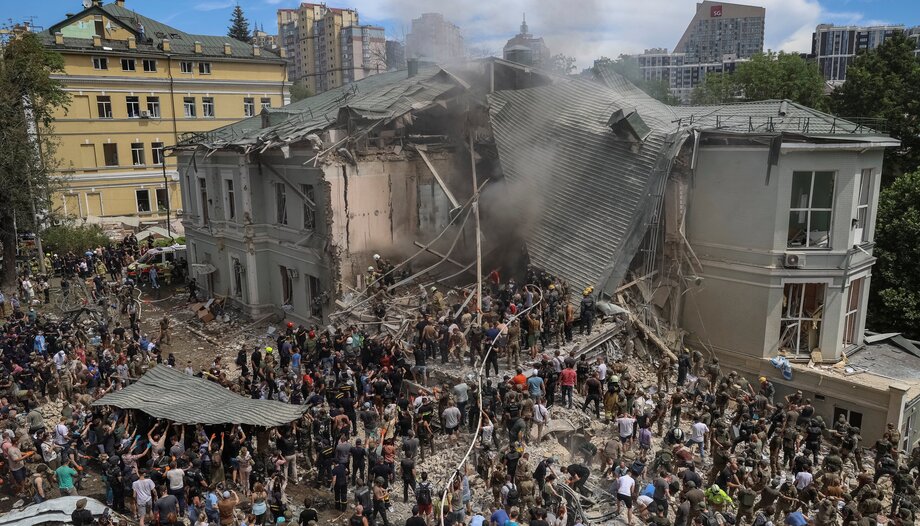There was no time to rejoice over the release of two Greek Catholic priests imprisoned for more than two years, when the dream of peace in Ukraine was again put to the test.
Indeed, Russia attacked Kiev on July 8, striking two major Ukrainian medical centers, including Ukraine's largest pediatric hospital, leaving 27 dead in the capital alone and 38 in total, and more than a hundred wounded.
It was a brutal attack, which led, exceptionally, to the Holy See to send a communiqué highlighting Pope Francis' "deep anguish" and his call for "concrete ways to put an end to the ongoing conflicts".
The statement came on July 10, and also referred to the attack on a UN-run school in Gaza. But while the Holy Land's entry onto the scene is relatively more recent, coming on the heels of the Israeli response to the brutal attacks of October 8, 2023, in the last two years Pope Francis has always addressed a thought to the "tormented Ukraine" at the end of general audiences and Angelus prayers.
However, the diplomacy of the Holy See seems blocked, unable to really work. The Holy See's willingness to mediate went unheeded. Nevertheless, the Holy See succeeded in the humanitarian field and, above all, in the exchange of prisoners.
Release of the two Greek-Catholic priests
On June 28, news arrived that Greek Catholic priests Ivan Levytskyi and Bohdan Heleta had been released from Russian captivity. The two, members of the Congregation of the Most Holy Redeemer, were released after a prisoner exchange. They had spent almost two years in captivity after being arrested in Berdyansk on November 16. They had not been heard from for a long time.
The Ukrainian Greek Catholic Church, to which the two priests belonged, has spared no effort in recent years to have the two priests released, and so has the Holy See, which has opened discreet channels in these almost two years to allow the release of the two priests.
Before the urbi et orbi blessing of last Easter, Pope Francis launched the "All for All" campaign, in which he called for a full prisoner exchange between Russia and Ukraine. The release of the two priests is also part of the efforts of this campaign.
The prisoner exchange is a separate initiative from that of the return home of Ukrainian children currently on Russian territory because of the war.
The return home of the children - deported according to the Ukrainians, taken in by families according to the Russians - was the objective of the Cardinal's mission. Matteo Zuppi, Pope's envoy to Ukraine and Russia - as well as to the United States and China - precisely in order to open a channel of exchange. The mechanism worked, albeit for a smaller number of children than the Ukrainians had claimed. Now, there is also a good sign of the prisoner exchange mechanism.
In short, the Holy See's diplomacy is yielding some positive results. So much so that His Beatitude Sviatoslav Shevchuk, major archbishop of the Ukrainian Greek Catholic Church, wished to thank Pope Francis directly in a statement published on June 29 for having "personally contributed to the release of our Redemptorist priests Bohdan and Ivan", stressing that "despite the great obstacles, since their captivity lasted more than a year and a half, the efforts of Vatican diplomacy achieved a victorious result".
In addition to thanking the Holy See's diplomats, Cardinal Parolin and Cardinal Zuppi, "to whom the Holy Father entrusted the care of the release of Ukrainian captives and prisoners," Shevchuk also gave special thanks to Archbishop Visvaldas Kulbokas, apostolic nuncio to Ukraine.
Ukrainian President Zelensky also thanked the Holy See for its work.
The diplomatic front
What is happening on the diplomatic front? Cardinal Pietro Parolin, Vatican Secretary of State, who participated in the High Level Summit for Peace in Ukraine, held in Switzerland on June 15-16, gave clear guidance.
The Holy See did not sign the final declaration because it was only an observer country. However, it shared its spirit with a speech by Cardinal Parolin.
While noting Russia's absence from the summit, Parolin recalled that the only way to have a true, stable and just peace is "dialogue between all the parties involved," and expressed his hope that "the diplomatic efforts currently being promoted in Ukraine and supported by so many nations will be enhanced."
Parolin recalled that the Holy See "reaffirms the validity of the fundamental principle of respect for the sovereignty of every nation and the integrity of its territory," not trivial words that are a clear condemnation of Russian aggression.
At the same time, he added that the Holy See is "concerned about the tragic humanitarian consequences of the conflict" and is therefore at the forefront of work to facilitate the repatriation of children and encourage the release of prisoners.
In fact, the Holy See is also an observer in the International Coalition for the Repatriation of Ukrainian Children from Russia and is in direct contact with the Russian and Ukrainian authorities through a mechanism created following the visit of Cardinal Matteo Zuppi to Kiev and Moscow.
The Holy See also declares itself concerned about the lack of respect for the Geneva Conventions in the treatment of prisoners, both civilian and military, and regrets "the difficulty of setting up with the International Red Cross Committee a joint medical commission that could deal with the situation of prisoners of war in need of urgent care."
But above all, Cardinal Parolin also stated that the Holy See is committed to maintaining contacts with both the Russian and Ukrainian authorities and is ready to assist in the implementation of possible mediation initiatives that are "acceptable to all parties and beneficial to those concerned."
In short, in case of a glimmer of hope for peace, the Holy See would be ready to help.








